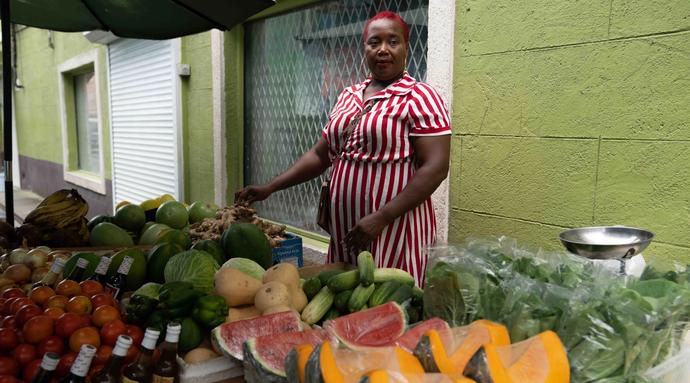Peru
Navigating Uncertainty
The IMF collaborates with countries in the face of multiple global economic shocks.
In an uncertain, shock-prone global environment, decisive, well-calibrated, and agile policies tailored to country-specific circumstances are key to entrenching economic sustainability, safeguarding macroeconomic and global financial stability, supporting the vulnerable, and strengthening resilience. Reinforcing international cooperation and multilateralism is essential to bolster global growth; protect the stability of the international monetary system; address persistent health risks; and accelerate mutually reinforcing efforts toward a green, digital, and inclusive future.
In this context, the IMF continues to help member countries address these challenges through its lending, surveillance, and capacity development (CD) work.
Lending
The IMF has stepped up its lending to countries and continues to reassess its lending toolkit to ensure its responsiveness and adaptiveness to emerging needs. Since Russia’s invasion of Ukraine, the IMF has approved 41 requests from 38 member countries for SDR 95.2 billion ($128 billion) in new financing commitments, bringing total support since the beginning of the pandemic to SDR 218 billion ($294 billion) for 96 countries.
Two new lending facilities became operational in FY2023:
- The new Resilience and Sustainability Trust (RST) provides long-term affordable financing to help members address longer-term challenges, including climate change and pandemic preparedness. During FY2023, the IMF Executive Board approved five Resilience and Sustainability Facility (RSF) arrangements, for a total of about $3.4 billion, and more than 40 additional eligible countries across different regions and income groups have also expressed interest in an RSF arrangement.
- The new Food Shock Window (FSW) provides an additional channel for emergency financing to member countries that have urgent balance of payments needs due to acute food insecurity, a sharp increase in their food import bills, or a shock to their cereal exports. Since the FSW’s approval in October 2022, six countries have accessed this financing for a total of about $1.8 billion.
In addition to the new facilities highlighted, emerging market economies have benefited from approved financing under new programs supported under the General Resources Account (GRA) through the Extended Fund Facility (EFF), Flexible Credit Line (FCL), Precautionary and Liquidity Line (PLL), and Stand-By Arrangement (SBA). Countries that received such financing include Barbados, Egypt, Sri Lanka, and Ukraine (EFF); Morocco (FCL); Jamaica and North Macedonia (PLL); and Armenia, Georgia, and Serbia (SBA).¹ Several emerging market economies also continued to benefit from access to the Fund’s precautionary facilities, with currently about SDR 65.6 billion ($88 billion) committed under the FCL and PLL.
¹ In addition, four other countries, namely, Bangladesh, Benin, Mauritania, and Papua New Guinea also benefited from GRA financing (EFF) in the context of blended Poverty Reduction and Growth Trust (PRGT)/GRA arrangements.
Figure 1.1
Growth and Inflation

The economic slowdown is most pronounced in advanced economies. Inflation is falling more slowly than anticipated.
Sources: IMF, April 2023 World Economic Outlook; and IMF staff calculations.
Ukraine’s New IMF-Supported Program
On March 31, 2023, the IMF’s Executive Board approved a financial arrangement for Ukraine amounting to $15.6 billion over four years through 2027. The arrangement, under the Extended Fund Facility, is part of an international $115 billion financial package for the same four-year period, intended to support the authorities’ policies with respect to stabilizing the economy as war continues and to entrench more expansive reforms to speed recovery once the war winds down.
The newly approved arrangement under the Extended Fund Facility is the third and final stage of a strategy developed with the authorities to support Ukraine. The first stage was emergency financing totaling $2.7 billion through the Rapid Financing Instrument in 2022. The second stage was a four-month Program Monitoring with Board Involvement, approved in December 2022. The authorities’ strong performance during the second stage paved the way toward the full-fledged IMF program.

Surveillance
In FY 2023, the IMF published a number of multilateral surveillance reports, including the World Economic Outlook, Global Financial Stability Report, Fiscal Monitor, and External Sector Report. The IMF also conducted 126 Article IV consultations and 9 Financial System Stability Assessments under the Financial Sector Assessment Program (FSAP).
The IMF is continuing to refine its bilateral surveillance activities, including refinements to take into account a wider set of macroeconomic forces. For example, this year, climate considerations were further incorporated into IMF surveillance activities, including through the publication of Staff Climate Notes. The IMF also adopted its first comprehensive strategy for mainstreaming gender to help its members address macroeconomically significant gender gaps.
Capacity Development
Through capacity development, the IMF helps countries build strong institutions and boost skills to formulate and implement sound macroeconomic and financial policies. In FY 2023, the IMF trained more than 15,000 country officials, conducted more than 2,000 CD visits involving more than 1,500 experts, and delivered more than 500 training courses in seven languages. The 2023 Review of the Fund’s CD Strategy aims to follow up on a 2018 review and modernize the IMF’s management, administration, and delivery of CD.
Since Russia’s invasion of Ukraine, the IMF has provided member countries with
billion in financing

Read Next
Cost Of Living Crisis
Countries contend with high inflation and commodity prices, many with IMF support.